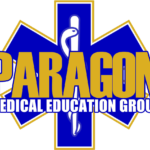Dr. Joe Holley on Training and Recent EMS Conferences
Podcast: Play in new window | Download
Subscribe: Apple Podcasts | RSS | More

Dr. Joe Holley comes back after being off the show for a few months due to extensive travel for training and conference attendance. We discuss the inflow of respiratory illness to our nation’s hospitals and the difficulties finding rooms and beds for patients who need them.
After we talk about the hospital side of things, Joe shares some of his recent training travels for Paragon Medical Education Group. Sam then discusses some of the anticipated changes pending with FEMA as the U.S. federal government goes through significant restructuring. Joe proposes that perhaps the response and recovery components of FEMA might be separated from each other due to the different natures of their missions.
Also on the show were co-hosts Sam Bradley and Jamie Davis.
Scroll down for Podcast Discussion Summary
 Thank you as always to Paragon Medical Education Group for their long-term support of the Disaster Podcast. Dr. Joe Holley and the team at Paragon continue to provide excellent and customized disaster response training to jurisdictions around the U.S. and internationally as well.
Thank you as always to Paragon Medical Education Group for their long-term support of the Disaster Podcast. Dr. Joe Holley and the team at Paragon continue to provide excellent and customized disaster response training to jurisdictions around the U.S. and internationally as well.
Podcast Discussion Summary
Emergency Department Overload and Innovations
Joe reports on his recent activities, including attending the National Association of EMS Physicians meeting in California and conducting a cadaver lab training for an aeromedical service in the southeastern US. He discusses testing a new bandaging product from Israel, which features a grid system for monitoring bleeding.
The conversation then shifts to the current overload in emergency departments across the country, which is largely attributed to viral infectious diseases, including flu and concerns about avian flu. Jamie and Sam share personal experiences of family members facing extended hospital stays and ER waits due to overcrowding, highlighting the strain on the healthcare system.
FEMA’s Role and Potential Changes
Joe and Sam discussed potential changes at the Federal level, particularly concerning FEMA. Joe suggested that the response and recovery components of FEMA might be separated, with the response side potentially moving to another entity. He also mentioned upcoming training exercises and labs.
Jamie agreed that separating the two halves of FEMA might make sense, but expressed concern about the potential challenges of such a separation. Sam emphasized the importance of maintaining consistent training across different states to ensure effective teamwork in disaster situations. Joe and Sam agreed that FEMA’s role in assisting overwhelmed local and state resources is crucial, especially in multi-state disasters.
Supraglottic Airways Research and Future Plans
Sam, Joe, and Jamie discussed a research project involving supraglottic airways. Joe explained that they have conducted two published studies comparing supraglottic airways to tracheal tubes, focusing on their sealing ability and impact on blood flow during emergent conditions. They are considering a third study to better understand how much these devices might leak and how it might affect ventilation.
The team plans to utilize cadaveric tissue for this study, with the aim of starting a pilot evaluation in the next few months. Jamie expressed his excitement about the potential for improved outcomes from this research. Sam suggested a future episode could be a retrospective on the changes in CPR techniques over time.
Rescuing and Rehabilitating Dutch Shepherd
Joe shared the story of how his wife, a canine handler, rescued a malnourished Dutch Shepherd named Leo from a parking lot. Leo has since gained 16 pounds and is showing great potential as a search and rescue dog. Joe noted that Dutch Shepherds are generally smaller in build than German Shepherds and tend to have fewer hip issues. The team expressed their appreciation for the rescue and the good home Leo has found.
Paragon Medical Education Group Resources
In the meeting, Jamie and Joe discussed the resources available from Paragon Medical Education Group, including training for state search and rescue teams. Joe encouraged anyone interested to reach out to them through their website or Facebook page.
Jamie and Sam also discussed their social media presence and encouraged listeners to subscribe to the show. Joe shared updates about his dog, Leo, who has been recovering and is now doing well. The team expressed their appreciation for Joe’s contributions and wished him well.
Catch the full episode using the player above or on your favorite podcast platform, and don’t forget to subscribe to the Disaster Podcast for weekly insights from leaders in disaster response and research!


Recent Comments